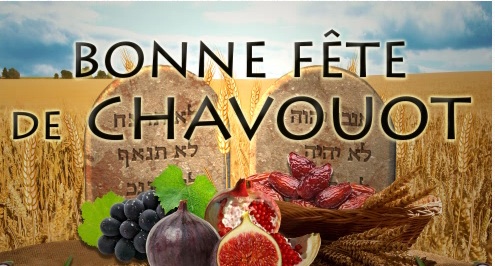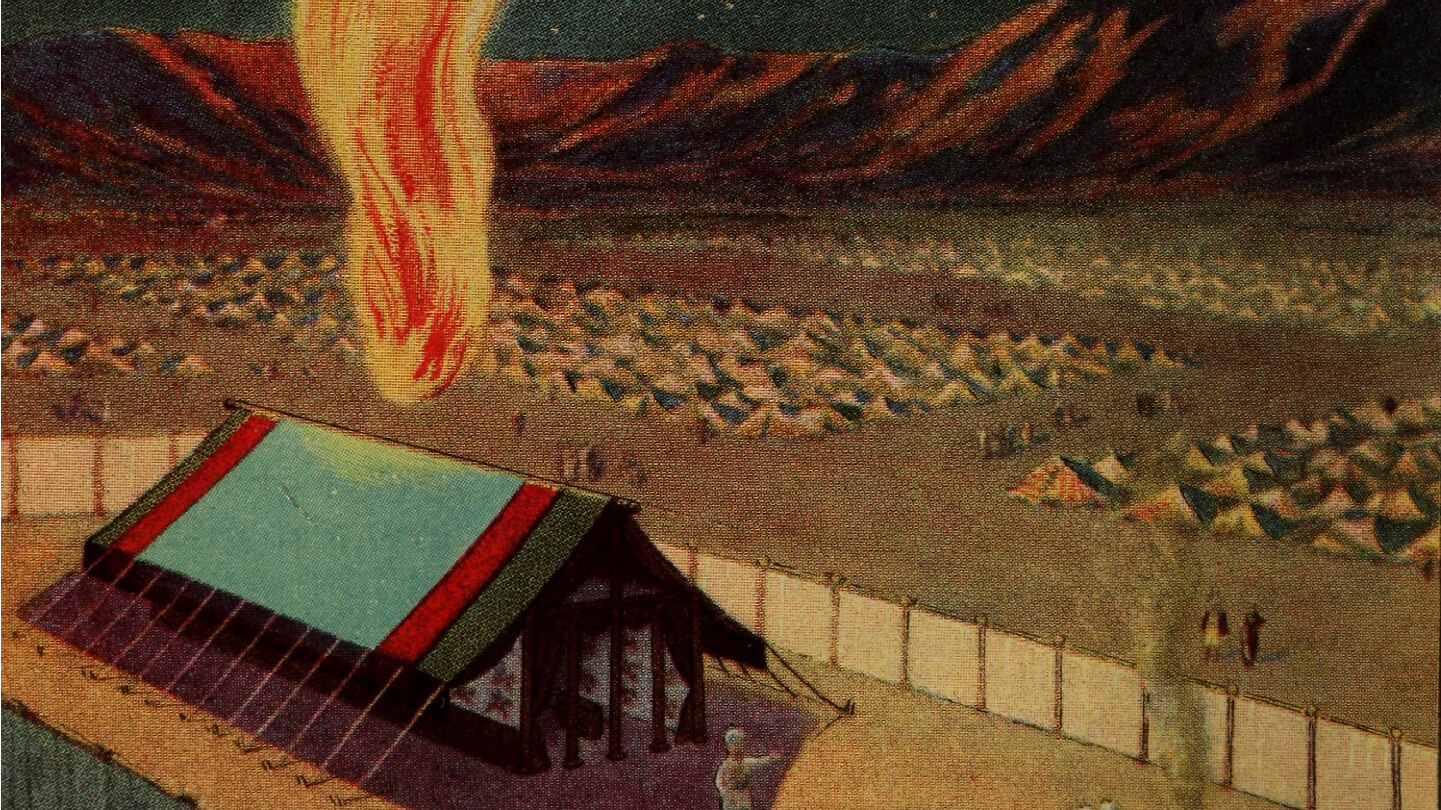Hi Bonjour / Hello [nickname_else_first_name]
Shavuot ( listen (help·info)), or Shavuos (
listen (help·info)), or Shavuos ( listen (help·info)) in some Ashkenazi usage (Hebrew: שָׁבוּעוֹת, Šāvūʿōṯ, lit. "Weeks"), commonly known in English as the Feast of Weeks, is a Jewish holiday that occurs on the sixth day of the Hebrew month of Sivan (it may fall between May 15 and June 14 on the Gregorian calendar). In the Bible, Shavuot marked the wheat harvest in the Land of Israel (Exodus 34:22). In addition, Orthodox rabbinic traditions teach that the date also marks the revelation of the Torah to Moses and the Israelites at Mount Sinai, which, according to the tradition of Orthodox Judaism, occurred at this date in 1314 BCE.[2]
listen (help·info)) in some Ashkenazi usage (Hebrew: שָׁבוּעוֹת, Šāvūʿōṯ, lit. "Weeks"), commonly known in English as the Feast of Weeks, is a Jewish holiday that occurs on the sixth day of the Hebrew month of Sivan (it may fall between May 15 and June 14 on the Gregorian calendar). In the Bible, Shavuot marked the wheat harvest in the Land of Israel (Exodus 34:22). In addition, Orthodox rabbinic traditions teach that the date also marks the revelation of the Torah to Moses and the Israelites at Mount Sinai, which, according to the tradition of Orthodox Judaism, occurred at this date in 1314 BCE.[2]
The word Shavuot means "weeks", and it marks the conclusion of the Counting of the Omer. Its date is directly linked to that of Passover; the Torah mandates the seven-week Counting of the Omer, beginning on the second day of Passover, to be immediately followed by Shavuot. This counting of days and weeks is understood to express anticipation and desire for the giving of the Torah. On Passover, the people of Israel were freed from their enslavement to Pharaoh; on Shavuot, they were given the Torah and became a nation committed to serving God.[3]
- Wikipedia
Traditionally our community eats dairy only during the holiday of Shavouot
CLICK HERE TO DOWNLOAD
Table of contents
1) Perashat Hashavoua & Shavuot - Rabbi Eli Mansour
2) Halakhat Hashavoua - Hazzan David Azerad
3) Holy Jokes!
1)PERASHAT HASHAVOUA
This Week's Parasha Insight with Rabbi Eli Mansour
Parashat Bamidbar- The Origins of Jewish Tenacity
The Midrash, commenting on the opening verse of the Book of Bamidbar, observes that the Torah has been compared to three natural phenomena: fire, water and a desert. Many Rabbis raised the question of what precisely the Midrash seeks to teach us through this observation. Why is it important for us to know that the Torah is compared to these three phenomena?
One explanation is that the Midrash seeks to draw our attention to the roots of one of the Jewish people’s most outstanding and consistent character trait: our innate stubbornness and tenacity, our refusal to surrender even under the harshest conditions. Throughout the millennia, Jews have shown their readiness to make enormous sacrifices – including the ultimate sacrifice, of their own lives – for their faith. Whether it was in Germany or Spain, in Russia or in Syria, Jews stubbornly clung to the Torah despite unbearable pressures. Even here in the United States, where we enjoy the freedom to practice our faith without fear of persecution, we are nevertheless subjected to an unrelenting onslaught of cultural pressures and lures, and yet so many Jews, Baruch Hashem, remain steadfastly committed to Torah study and observance, heroically resisting these pressures.
The Sages teach us that this extraordinary quality originates from three sources: fire, water, and the desert.
It began with Abraham Abinu, who refused to renounce his beliefs even at the threat of being thrown into a furnace. The fire of Abraham has been passed down to his descendants, to the countless generations of Jews who were prepared to give all they had, and their lives, for their faith.
But Abraham’s example was the source of individual devotion, people making the personal decision to make great sacrifices. The concept of a nationwide sacrifice, of the Jewish people collectively sacrificing themselves for their belief, began in the water – at the Sea of Reeds. Following God’s instructions, the nation headed straight into the raging waters of the sea. They were not told that the sea would be transformed to dry land. But they trusted that God would somehow rescue them, and with unfailing faith, they proceeded onward into the water. This established the precedent of nationwide sacrifice for the sake of God.
Still, these two incidents – the heroism of Abraham and of Beneh Yisrael at the sea – were momentary events. What remained to be seen is whether this stubborn, steadfast devotion could endure over an extended period of time. And so the third origin of Jewish tenacity is the wilderness, the forty-year period that Beneh Yisrael spent traveling through an uninhabitable desert. Their only food was the miraculous daily ration of manna, their only water source was the miraculous traveling well, and their only source of protection from the elements, animals and attackers was the miraculous clouds of glory. Placing their trust in God, Beneh Yisrael lived for forty years in a place where there is no possibility of survival through natural means. This set the example of our ability to withstand pressures and hardship even for many years, to refuse to relinquish our faith even through lengthy periods of difficulties and sacrifice.
As mentioned, we face enormous pressures and challenges here in the United States. Day in, and day out, week after week, month after month and year after year, we live with the temptation of material indulgence, the prevalent obsession with wealth, and the pervasive culture of permissiveness and immorality. We have good reason to take pride in our stubbornness, in the beautiful Torah homes, communities and institutions that we’ve built despite these persistent pressures, in the way we have remain stubbornly committed to our traditions rather than accept defeat. Even today, we live "Bamidbar," in the desert, in a constant condition of challenge and struggle. May we continue to draw inspiration from our ancestors in our attempts to overcome the obstacles in our path, withstand pressures, and remain proudly and steadfastly committed to God and His Torah.
Youtube Video: Rabbi Mandour preparing for Shavuot
2) HALAKHAT HASHAVOUA
Selected & translated by David Azerad, Hazzan Maghen Abraham
The laws of Shavuot, according to the rulings of Rabbi Obadiah Yosef Z”TL
When Shavuot falls on a Saturday night - how should we proceed?
One should light on Friday night before lighting the Shabbat candles, a large candle that can last for at least 48 hours , so that there is a lit fire ready for Saturday night to light the candles for Chag Shavuot ,as we can only light from an existing fire. One should be careful to light the candles only after the Shabbat is over.
Since the time is limited to cook on Motzei Shabbat, it is therefore appropriate to cook all the meals of the Chag on Friday and leave them in the fridge or freeze them, and at the end of Shabbat you can heat the food in the oven or stovetop that was lit before Shabbat or if it is a gas oven one may light it from an existing flame
How to prepare from Shabbat to Yom Tov?
It is permissible to take out the prepared frozen meals out of the freezer to thaw them for the holiday meal. However one may not start any other preparations, such as lighting a fire and cooking until Motzei Shabbat.
It is permissible to rest on Shabbat in order to be awake and have strength on Motzei Shabbat for the Limud / Tikkun Leil Shavuot or keraya ,just not to say that you are sleeping in order to stay awake for the night as it is considered preparing from Shabbat to Yom Tov.The custom on the night of Shavuot is to stay awake all night or at least part of the night to study Torah.The Sephardim have the custom to read in the book Keri-ai Moed that has in it the entire Seder for the night.
What should one be doing on Shavuot?
One should try to engage in the study of Torah throughout the Chag.As much as it is important to have festive meals and rest it is equally important to study Torah as it is written “חציו לה' וחציו לכם” which means half of the time of the holiday is dedicated for Hashem (prayers and Torah study) and the other half of the day is dedicated for us having a festive meal and resting.
The custom of the Sephardim is to read on both days Megillat Ruth, one part the first day and the second part the next day. It is also the custom to read the Azharot also on both days Mitzvot Ase and Mitzvot Lo Ta’ase founded by Rabbi Iben Gvirol, As well as to study the Rambam Mitzvot Ase and Mitzvot Lo Ta’ase all found in the book Keri-ai Moed.
King David was born and died on Shavuot, so it is customary to read the Book of Psalms on Shavuot as well.
Bevirkat Shabbat Shalom Umevorach
Chag Shavuot Sameach
David Azerad
3) HOLY JoKeS!!
Selection of funny snippets, loosely related to this weeks parashah, to brighten your day
Q. What kind of man was Boaz before he married?
A. Ruth-less.
Q. Which servant of G-d was the most flagrant lawbreaker in the Bible?
A. Moses. He broke all 10 commandments at once.
Q. Did you know it’s wrong for a woman to make coffee? Yup, it’s in the Bible. It says . . .
A. “He-brews”
Q: Where is medicine first mentioned in the Bible?
A: When God gave Moses two tablets.
Q: What do you call cheese that is sad?
A: Blue cheese.
Q. Which hotel serves the best cheese?
A: The Stilton
Q: Why does cheese look sane?
A: Because everything else on the plate is crackers.
Q. What does a cheese say on Shavuot?
A: Have E-dam good day!
Q. What type of cheese is made backwards?
A. EDAM.
Q. After Shavuot we all need to go on diet. Why?
A. To cheddar a few pounds.













